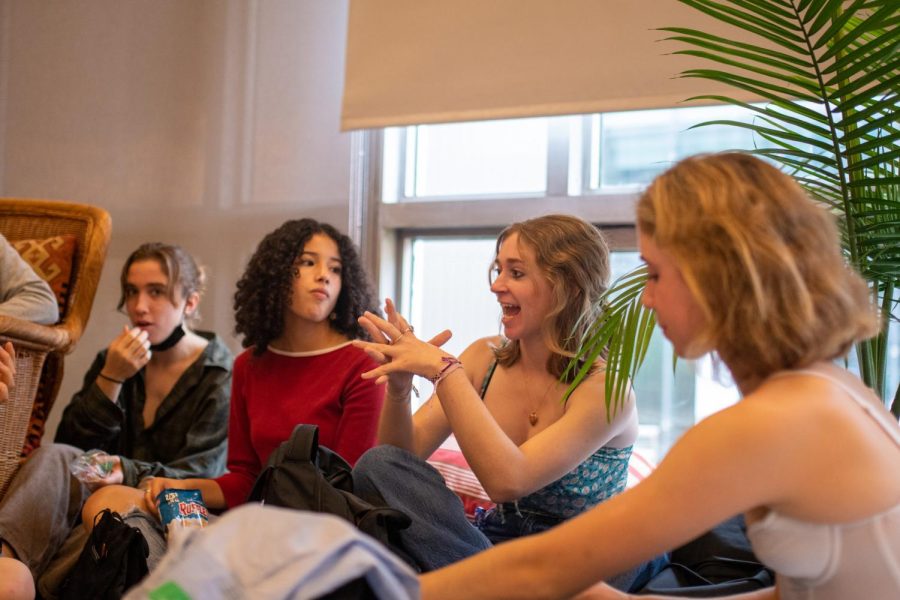Striving toward gender equality
Feminism clubs’ shared goals fulfill needs, invite effort
EXPANDING FEMINISM. Juniors Santana Romero, Norie Kaufman-Sites and Stella Sturgill converse during an Intersectional Feminism club meeting on Oct. 24. Intersectional Feminism club focuses on the empowerment of groups that are marginalized.
October 26, 2022
A sea of students flows throughout the cafeteria during Club Shopping as group leaders urge people to sign up. Amid the chaos — and more than 80 clubs — are leaders from at least five clubs that focus on the empowerment of women.
These U-High clubs tackle some of the same issues, but their leaders say there is room for all of them and that each fills a distinct need. In fact, they say, there is room for more.
“I feel like we’re all kind of striving toward a similar goal,” said Maggie Bai, a president at Girls Who Code. “So I don’t think that there’s tension between all the female empowerment clubs, because we’re all kind of trying to empower women.”
Girl Up vice president Sarina Zhao said that every group offers a different angle.
“There are benefits to each,” Sarina said, “and I think it’s really cool to see all these clubs around the school.”
Girl Up focuses on gender equity, taking part in activities like fundraising and workshops focused on gender equity for middle school students. The club is part of an international organization founded in 2010 as an initiative by the United Nations Foundation.
“I think a lot of the other clubs focus, again, just on a specific lens to view gender inequity,” Sarina said. “Our club kind of does a more overarching approach to some of these issues.”
Girls Who Code, a new club, encourages young women who are passionate about computer science to learn coding and pursue career interests in tech. Already, 34 students have expressed interest in joining the group.
A more established club, Women in STEM, also leans toward math and science. Its emphasis, though, aims more at networking and guidance, from science experiment days with younger students to mentorships with college students for club members. The group is part of a far larger organization with chapters across the country and beyond.
Ana Cucalon, Lab chapter president of Women in STEM, said the club’s unique focus on careers in STEM differentiates it from the other women-centered groups, and that there is more than enough room for all.
In the group Young Women of Color, members say they find ways to create a safe place to be their most authentic selves, supporting one another with their experiences at U-High and outside of school.
“YWOC is centered around the empowerment of women of color and the intersectionality of what it means to be a woman and of color,” said Kiran Chinniah, the president of Young Women of Color.
Another club, Intersectional Feminism, looks more broadly at empowerment and groups that are marginalized — not only women.
“It’s not constricted or restricted to women or to people with uteruses,” said Stella Sturgill, a co-president. “It applies to anyone who experiences some kind of system of oppression. I think that’s one thing that really sets us apart.”
While these groups share similar aims, leaders said they don’t work together as much as they could. In fact, several said that more collaboration between the clubs might accomplish even more.
“I definitely think that it would be valuable to have more communication among all these clubs,” Sarina said. “While we do different things, and we have different focuses, we do have a shared focus and overall goal.”




























































